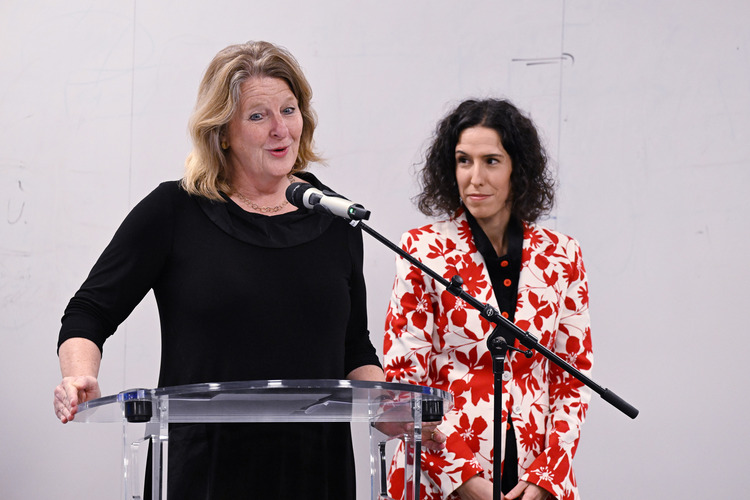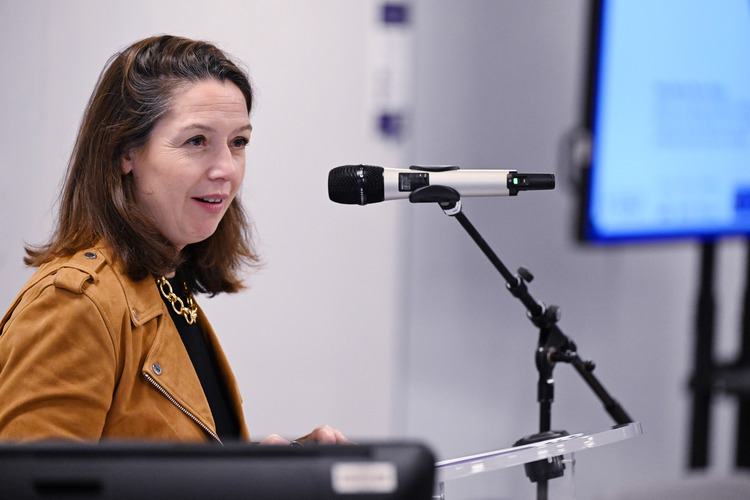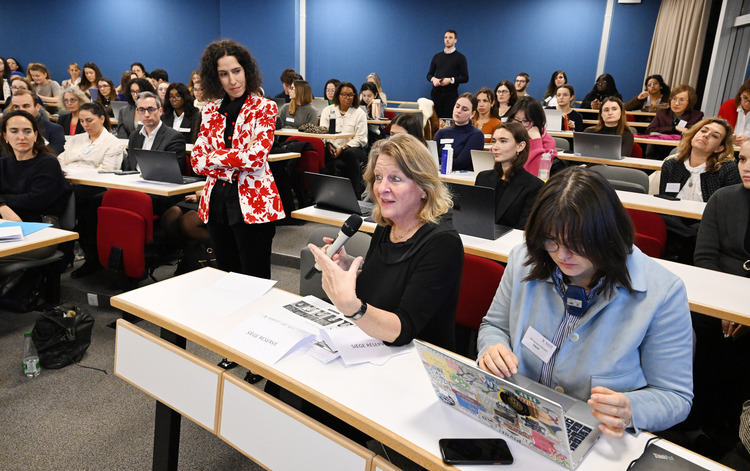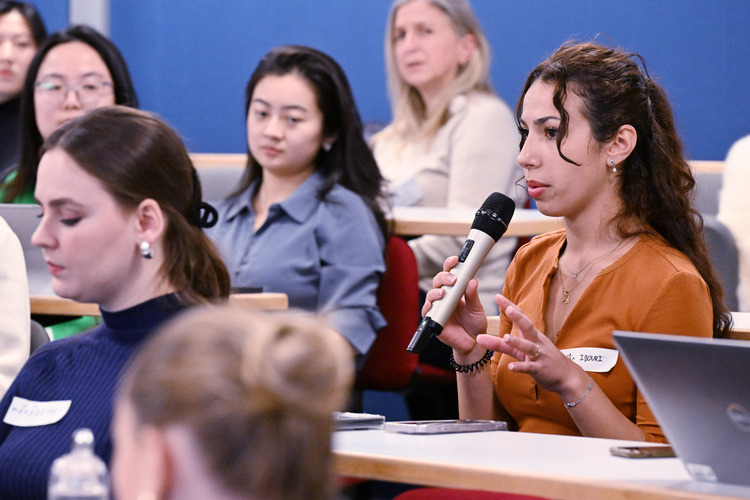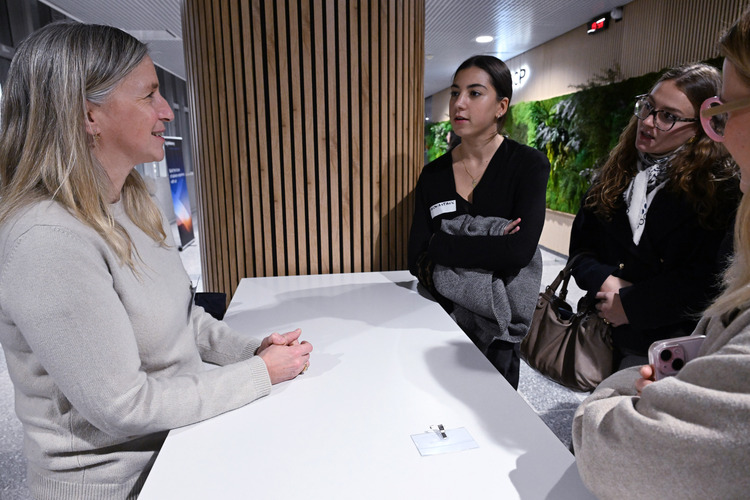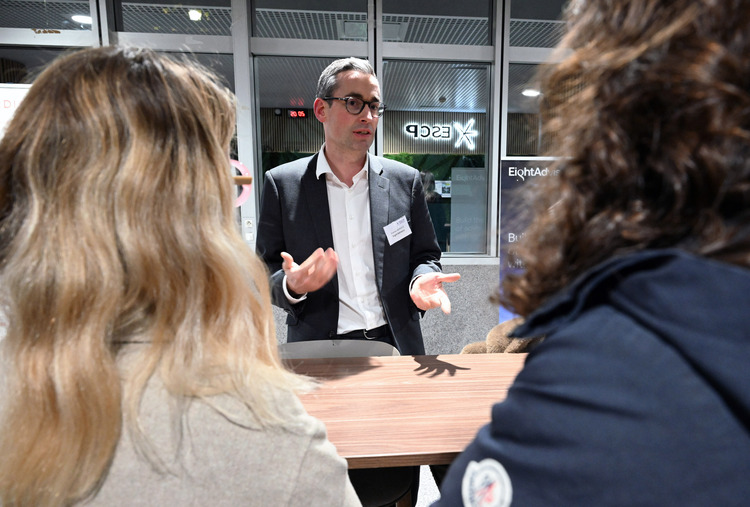Bridging academia, industry, and the student community, the Chair Annual Event explored the structural reforms and professional networks needed to strengthen women’s influence in finance
Opening And Research Highlight
The event began with a warm welcome from Professors Almudena Cañibano and Marion Festing, Scientific Directors of the Chair, who presented the latest research findings. Their presentation underscored the importance of evidence-based understanding in shaping more inclusive financial environments.
Drawing on three recent studies, they highlighted:
- The need to encourage early exposure to finance among young women, helping them build confidence and interest to specialise in this field;
- How well-designed paternity leave policies can shift cultural norms and promote gender equality at home and in the workplace;
- The importance of supporting women’s agency in managing their visibility and recognition within financial careers.
More details on these insights can be found here.
Keynote Speech: Le Pouvoir Économique Des Femmes
The keynote speech was delivered by Marie-Pierre Rixain, Member of the French Parliament and architect of the landmark Rixain Law on women’s professional and economic equality. Her address emphasized the transformative power of women’s economic participation and the importance of legislative frameworks in driving systemic change.
Madame Rixain recalled Simone de Beauvoir’s assertion that economic independence constitutes a fundamental prerequisite for the realization of civil rights. She situated this idea within the context of a society undergoing a profound transformation, one with the potential to redefine power dynamics and advance women’s financial autonomy. This evolution, she noted, stems not only from women’s longer life expectancy compared to men but also from their increasing capacity to seize emerging opportunities derived from collective progress and intergenerational legacy.
According to recent research cited by Madame Rixain, women now save at rates comparable to men. However, due to an ingrained and socially constructed aversion to risk, rooted in long-standing disparities in remuneration and non-existence of women’s own economic identity, they tend to invest less frequently.
Consequently, she argued, it is imperative to dismantle, step by step, the systemic inequalities that continue to obstruct the establishment of a genuinely egalitarian society. Transforming dormant capital into instruments of autonomy, she contended, is an essential step in this process.
Women are progressively becoming autonomous economic and fiscal agents, equal to men and no longer constrained by outdated household models that impede their financial independence, such as barriers to opening individual bank accounts. Nonetheless, Madame Rixain emphasized the persistent lack of fiscal independence, which continues to impede married women’s capacity for effective and autonomous long-term financial planning. Furthermore, she highlighted the broader democratic significance of this transformation, stressing the importance of sustained vigilance against political movements or regimes that may attempt to erode women’s rights.
Madame Rixain concluded by saying that it is with tenacity and patience that we can progressively start changing behaviours and reforms that will transform the money in women’s hands into power. A power to exist, to choose, to leave, and to create.
Panel Discussion: Women, Money And Power
A dynamic panel discussion followed, moderated by Tatiana Allen-Zufolo, ESCP Bachelor in Management Student, and member of ESCP Finance Society. The panel featured leading voices in the financial industry:
- Marion Calcine, Chief Investment Officer Infrastructure & Senior Managing Director at Ardian
- Eric Demuyt, General Manager & Founder at Eight Advisory
- Mounir Corm, Deputy CEO & Founding Partner at Vauban Infrastructure Partners
- Nathalie Rossiensky, Senior Private Banker & Capital Partner at Lombard Odier
The panellists discussed the most effective tools for advancing women into senior leadership, highlighting the importance of intentional talent development and visible role models and sponsors. Nathalie Rossiensky noted that progression begins with identifying key talent early, establishing clear career paths, and ensuring employees have both mentorship and strong sponsorship who are advocates that could actively champion their advancement. Mounir Corm added that gender parity must also be modelled by leadership, citing Vauban’s female-led structure, 40% women across functions, transparent promotion criteria, and extended parental leave as critical levers for cultural change.
The conversation turned to navigating credibility in male-dominated sectors such as infrastructure, advisory, and private equity. Marion Calcine described the subtle but persistent discomfort women can face, yet emphasised openness to new opportunities, reliability, and sponsorship as key to building influence. Eric Demuyt underscored that diversity strengthens performance and stressed that leadership must enforce equal compensation and take a proactive approach to identifying and promoting female talent.
On the impact of gender diversity at senior levels, panellists agreed that mixed teams lead to more balanced, long-term-oriented decision-making. Nathalie Rossiensky pointed to women’s strengths in active listening, inclusive discussion, and long-range thinking. Marion Calcine echoed this, noting that women often bring heightened risk awareness and stronger focus on sustainable growth, which can influence board dynamics and investment policies. ranging from ESG priorities to responsible travel standards.
The panel also addressed the invisible norms that continue to hinder progress despite formal DEI policies and the broader political backlash surrounding such initiatives. Mounir Corm described Vauban’s multicultural environment as a buffer against regression, explaining that strong convictions, consistent policies, and alignment with measurable outcomes help maintain momentum. Eric Demuyt emphasised the responsibility of leaders to uphold progress and ensure that newly promoted talent feels confident and supported, rather than questioning their legitimacy.
Networking And Reception
The evening concluded with a cocktail reception, provisioning ESCP students with valuable networking opportunities alongside the Chair’s sponsoring companies and distinguished guests.
The Women in Finance Chair continues to expand its impact through mentoring programs, employer branding competitions and cutting-edge research projects. With over 150 mentor-mentee pairs, collaborations with industry networks, and ongoing studies on women in finance experiences and diversity initiatives, the Chair is shaping the future of finance by breaking cycles of underrepresentation and promoting inclusive leadership.

Campuses

